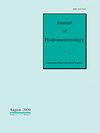基于优化的气候参数预测不确定度定性
IF 2.9
3区 地球科学
Q2 METEOROLOGY & ATMOSPHERIC SCIENCES
引用次数: 1
摘要
通过非线性建模工具对水文气候过程的点预测具有不确定性。本研究的主要目的是建立基于非线性人工神经网络(ANN)的蒸发和标准化降水指数(SPI)模型的预测区间(pi)。这是伊朗四个站点(即大不里士、乌尔米娅、阿达比尔和阿瓦士)的两个关键气候指标,用于确定其预测的不确定性值(UVs)。我们使用经典的Bootstrap (BS)、Mean-Variance Estimation (MVE)和Delta方法,以及基于优化的Lower-Upper Bound Estimation (LUBE)方法来构建和比较pi。采用基于小波的去噪方法对输入数据进行去噪,提高了建模性能。得到的结果表明,BS和LUBE方法能够估计不确定界。Delta方法由于其pi范围窄,大多无法找到期望的覆盖范围。另一方面,MVE方法由于其范围较宽,不能传达有价值的不确定性信息。根据得到的结果,对输入向量去噪可以使SPI建模中的PI质量提高高达76%。这比减少蒸发模式的紫外线更为显著,后者在Ardabil站观测到最多,高达30%。干旱本身比蒸发过程更随机的特性被解释为这种反应的原因。从结果来看,乌尔米亚站似乎是干旱风险最大的。本文章由计算机程序翻译,如有差异,请以英文原文为准。
Optimization-based prediction uncertainty qualification of climatic parameters
Point predictions of hydroclimatic processes through nonlinear modeling tools are associated with uncertainty. The main goal of this research was to construct Prediction Intervals (PIs) for nonlinear Artificial Neural Network (ANN)-based models of evaporation and the Standardized Precipitation Index (SPI). These are two critical indicators for climate for four stations in Iran (i.e., Tabriz, Urmia, Ardabil and Ahvaz) to qualify their predicted Uncertainty Values (UVs). We used classical techniques of Bootstrap (BS), Mean-Variance Estimation (MVE), and Delta, as well as an optimization-based method of Lower-Upper Bound Estimation (LUBE), to construct and compare the PIs. The wavelet-based denoising method was also adopted to denoise input data, enhancing the modeling performance. The obtained results indicate the ability of the BS and LUBE methods to estimate the uncertainty bound. The Delta method mostly failed to find the desired coverage due to its narrow PIs. On the other hand, the MVE method, due to its wide bound, did not convey valuable information about uncertainty. According to the obtained results, denoising the input vector could enhance the PI quality in the modeling of the SPI by up to 76%. It was more prominent than reducing the UV for evaporation models, which was observed the most at the Ardabil station, up to 30%. The inherently more random nature of drought than the evaporation process was interpreted as the cause of this reaction. From the results, Urmia station seems the riskiest regarding drought ventures.
求助全文
通过发布文献求助,成功后即可免费获取论文全文。
去求助
来源期刊

Journal of Hydrometeorology
地学-气象与大气科学
CiteScore
7.40
自引率
5.30%
发文量
116
审稿时长
4-8 weeks
期刊介绍:
The Journal of Hydrometeorology (JHM) (ISSN: 1525-755X; eISSN: 1525-7541) publishes research on modeling, observing, and forecasting processes related to fluxes and storage of water and energy, including interactions with the boundary layer and lower atmosphere, and processes related to precipitation, radiation, and other meteorological inputs.
 求助内容:
求助内容: 应助结果提醒方式:
应助结果提醒方式:


